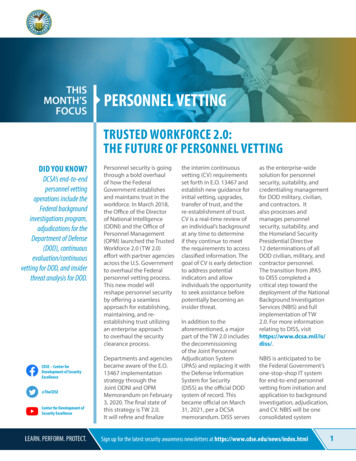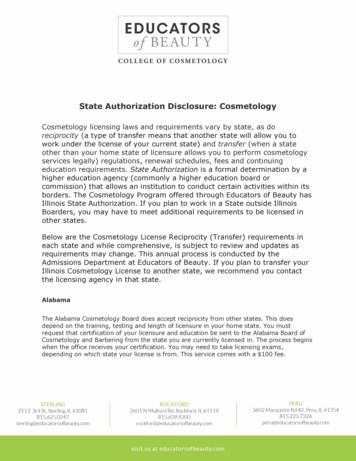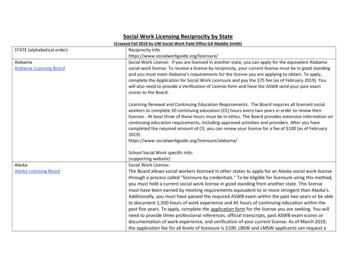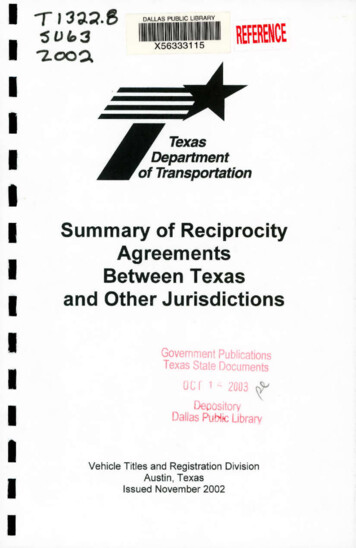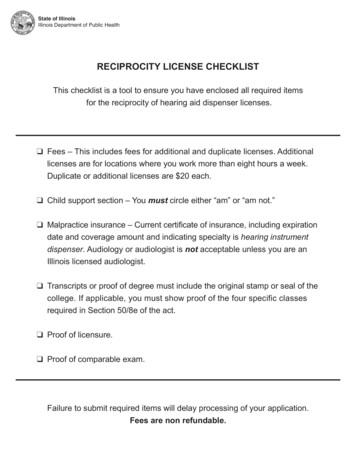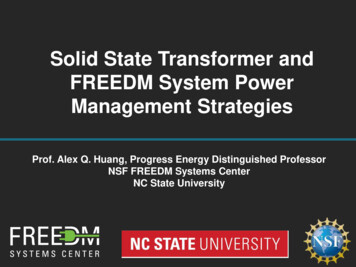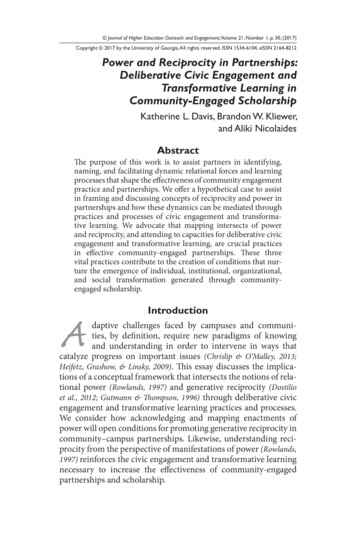
Transcription
Journal of Higher Education Outreach and Engagement,Volume 21, Number 1, p. 30, (2017)Copyright 2017 by the University of Georgia. All rights reserved. ISSN 1534-6104, eISSN 2164-8212Power and Reciprocity in Partnerships:Deliberative Civic Engagement andTransformative Learning inCommunity-Engaged ScholarshipKatherine L. Davis, Brandon W. Kliewer,and Aliki NicolaidesAbstractThe purpose of this work is to assist partners in identifying,naming, and facilitating dynamic relational forces and learningprocesses that shape the effectiveness of community engagementpractice and partnerships. We offer a hypothetical case to assistin framing and discussing concepts of reciprocity and power inpartnerships and how these dynamics can be mediated throughpractices and processes of civic engagement and transformative learning. We advocate that mapping intersects of powerand reciprocity, and attending to capacities for deliberative civicengagement and transformative learning, are crucial practicesin effective community-engaged partnerships. These threevital practices contribute to the creation of conditions that nurture the emergence of individual, institutional, organizational,and social transformation generated through communityengaged scholarship.AIntroductiondaptive challenges faced by campuses and communities, by definition, require new paradigms of knowingand understanding in order to intervene in ways thatcatalyze progress on important issues (Chrislip & O’Malley, 2013;Heifetz, Grashow, & Linsky, 2009). This essay discusses the implications of a conceptual framework that intersects the notions of relational power (Rowlands, 1997) and generative reciprocity (Dostilioet al., 2012; Gutmann & Thompson, 1996) through deliberative civicengagement and transformative learning practices and processes.We consider how acknowledging and mapping enactments ofpower will open conditions for promoting generative reciprocity incommunity–campus partnerships. Likewise, understanding reciprocity from the perspective of manifestations of power (Rowlands,1997) reinforces the civic engagement and transformative learningnecessary to increase the effectiveness of community-engagedpartnerships and scholarship.
Power and Reciprocity in Partnerships 31Community-engaged scholarship (CES) has a role in makingprogress on addressing tough social challenges and improvingpractices of democracy. When partners employ deliberative civicengagement activities in which intersections of power and reciprocity can be illuminated and considered, CES increases the possibilities for functioning effectively in its progressive democratic role.In an iterative cycle, when scholar-practitioners and communityleaders more effectively map power and reciprocity within deliberative community engagement practices, they increase capacities associated with more effectively managing partnership powerinequities. Our purpose is to provide a conceptual framework topromote identifying, naming, and facilitating these dynamic relational forces and learning processes that shape the effectiveness ofcommunity engagement partnerships.In order to more clearly identify the constructs considered, wewill offer a hypothetical community engagement example. Afterpresenting the example, we will clarify our use of key concepts asthey are situated in adult learning, leadership, and civic engagementliteratures. At points in the discussion, we return to the example todemonstrate how the constructs might link to community-engagedscholarship practices in a theory-to-practice progression and,finally, we offer conclusions about application and further research.Hypothetical ExampleA community-engaged scholarship (CES) project is beingdesigned to consider how local neighborhoods can more activelyparticipate in managing the quality of water in the area. The community–campus partnership hopes to balance economic needswith principles of environmental sustainability. Water-use issueshave historically been contested in this particular region. Not onlyis water quality essential to industry, but a sensitive local ecosystemhinges on clean groundwater. The partnership is a communityengaged scholarship project designed to consider mechanismsand pathways that offer neighborhoods increased responsibility inmanaging and enforcing water quality measures. The partners arerecognizing that improving water quality in the region through theactive participation of local neighborhoods falls into the categoryof adaptive challenges.An adaptive challenge, by definition, requires new ways ofknowing and understanding issues. In this case, participants willleverage community-engaged scholarship with the expectation ofgenerating transformative learning across community–campus
32 Journal of Higher Education Outreach and Engagementpartnerships. The goal is that deliberative civic engagement andtransformative learning processes will uncover ways in which theentire community feels ownership of the solution and activelyparticipates in the self-rule/regulatory process. The assumption isthat if a balance between concerns for water quality and economicgrowth is to be realized, the community will have to approach thischallenge equipped with new knowledge and alternative ways ofthinking about the issue, as well as increasing deliberative democratic processes in their engagement.The community–campus partnership includes students, faculty, professional organizations, civic organizations, and concernedcitizens from the various neighborhoods connected to the project.Throughout the design process all of the stakeholders have beeninformed and have discussed how community-engaged scholarship differs from expert-driven models. Everybody involved in theproject has made a good faith effort to shape the partnership inways that conform to the principles of community engagement(partnership, cocreation, community values, reciprocity, mutualbenefit, exchange of knowledge and resources, etc.). The community is supportive of cocreating teaching processes and outcomeswith professors and students, and research processes and outcomeswith faculty, which can be cycled as new knowledge about theissues.The participants have also recognized the need to create newways of knowing and learning in order to respond to this particular adaptive challenge. The community-engaged scholarship planincludes water quality tests, citizen science, traditional surveys, dialogue, interviews, public drama performances, and an art collectiveat a local farmers market. The partners have intentionally designeda scholarly process that includes multiple ways of knowing, as wellas a range of scholarly and research methods. Using a range ofways of knowing in the community-engaged scholarship processis intended to enable connection with a wider range of communitystakeholders.Despite all of the intentional partnership-building efforts,the community inquiry process is currently heading toward animpasse. If the potential stalemate is not recognized and mapped,communication and power enactment norms will continue tostructure power differentials and potentially undermine the qualityof the partnership. The emerging community and partnership tension can be viewed through the lens of communication and powerenactments, as well as transformative learning and deliberativecivic engagement.
Power and Reciprocity in Partnerships 33The business advocacy groups in the community have historically had significant influence in the region. In fact, key industrieshave previously commissioned and made investments in expertdriven studies to determine economic growth strategies. Acting intheir best interests, representatives from the business communityare leveraging professional jargon, media outlets, and results fromtheir studies to influence the design of the community-engagementprocess in ways that differ from those that all stakeholders hadinitially agreed upon.The environmental group would prefer a strategy that considershow the scholarly process can support environmental sustainabilityand a form of economic growth that is focused on improving thequality of jobs that exist in the region. The proposed growth ratesfrom the environmental group do not align with those of the progrowth business community, which would prefer a strategy that isfocused on development and creating new jobs. The quality of thejobs that are created and future environmental impacts are not aprimary concern for the progrowth business community.At this point in the project, before further decisions are considered, the partners agree to create a time and space in a neutral location that will be facilitated by a neutral moderator for all involvedto voice their positions, values, risks, concerns, fears, wishes, anddemands. The facilitated process provides a holding environmentin which the partners may openly and transparently share all information about the project that might have been previously hiddenor withheld. The goal of the facilitated discussion is for all to listenand be heard; for all to see and be seen by themselves and all others.The partners are aware that this process will require time,funds, and an experienced facilitator, and they have been proactive in planning for this contingency. They realize that this typeof open dialogue holds risks for all stakeholders, but the greaterrisk is the failure of the project to reach its primary goal, which isfor the entire community to claim ownership of the solutions andequitably participate in the decision-making process. The leadersrecognize a need for partners to engage in mapping of power andreciprocity, deliberative civic engagement, and transformativelearning. If they do not take time to create a holding environmentthat will allow these processes to emerge, the continuation of theproject could be at risk.
34 Journal of Higher Education Outreach and EngagementLiterature Review of Key ConceptsWe will consider first our use of five key concepts in adultlearning, leadership, and civic engagement literatures, and connect these to our hypothetical example for clarification. We areinterested in constructs of power, reciprocity, the intersects ofpower and reciprocity, deliberative civic engagement, and transformative learning. Foucault (1980, 1990, 2001) and Rowlands (1997)have developed theories of power that have informed the framework under discussion. Dostilio et al. (2012); Hoyt (2011); Jameson,Clayton, and Jaeger (2010); Janke (2012); and Saltmarsh and Hartley(2011) offer constructs of reciprocity that connect with our framework. Himmelman (2001) suggests a continuum that reflects theintersects of power and reciprocity. We turn to Gutmann andThompson (1996), Nabatchi (2012), and Offe and Preuss (1990),for our consideration of deliberative civic engagement processesand activities. Finally, we review the ways in which the thinkingof Drago-Severson (2004), Mezirow (1990, 1991, 1998), and Taylor(2009) influence our integration of transformative learning theoryand practices into community-engaged partnerships.Constructs of Power—Foucault, RowlandsSystems that connect and network people, including community-engaged scholarship partnerships, inherently involve elementsof power (Sandmann & Kliewer, 2012). The contextual and socialfeatures of community-engaged scholarship produce a matrix ofpower relations that impacts effectiveness. Foucault (1990) definedpower as themultiplicity of force relations immanent in the sphere inwhich they operate and which constitute their organization; as the process which, through ceaseless strugglesand confrontations, transforms, strengthens, or reversesthem; as the support which these force relations find inone another, thus forming a chain or a system, or onthe contrary, the disjunctions and contradictions whichisolate them from one another; and lastly, as the strategies in which they take effect, whose general designor institutional crystallization is embodied in the stateapparatus, in the formation of the law, in the varioussocial hegemonies. (pp. 92–93)Foucault’s understanding of power includes an account ofboth the production of the subject and of the subjugation of the
Power and Reciprocity in Partnerships 35object within force relations. Notably, Foucault’s description ofpower offers no judgment of power relations; that is, as conceivedby Foucault, power is neither positive nor negative; it just is. ForFoucault, power is not so much agency that people possess as it isthe sociopolitical economic contexts in which we exist. Yet, in thecontexts of community-engaged partnerships, we also recognizeinequalities and the negative impacts of power enactments by individuals who are acting out of their particular contexts (Dempsey,2010; Sandmann & Kliewer, 2012; Stoecker, Tryon, & Hilgendorf, 2009).With power existing in the environment, as Foucault theorized,persons are communicating and acting out those systems of powerin their partnerships. Recognizing and mapping inequities in oursystemic contexts, and facilitating the mutual sharing of powerfrom within those contexts, helps to mitigate the negative impactsof inequitable force relations in the partnership.In her work empowering women in Honduras, Jo Rowlands(1997) applied postmodern understandings of power to outline thefollowing four manifestations or enactments of power: (1) powerover, indicating control or compliance; (2) power with, such ascollaborative action; (3) power to, connoting productive actionto create new possibility; and (4) power within, or the sense ofagency, efficacy, and dignity (p. 13). In the framework we are recommending, the dimensions of power suggested by Rowlandsoverlap, bound, and define constructs of power enacted in community-engaged scholarship, and also coincide with typologies ofcommunity-engaged partnerships and reciprocity suggested withinthe literature.Enactments of power are apparent in the hypothetical case.For example, there is a tension between how power and knowledge are experienced and managed by the various partners inthe change process. The progrowth group has commissioned aneconomic study that is expert-driven and relies on forms of technical rationality and knowing, which can be interpreted as a powerenactment for control over the decision-making process. The use ofjargon, media, and research results are normative technical mechanisms that tend to exclude local neighborhoods and communitiesfrom the decision-making process. The partners with capital whocan access technical mechanisms often wield power in decisionmaking in U.S. culture.Meanwhile, the environmental sustainability group is endeavoring to arbitrate the economic realities of job growth in relationto sustainability objectives—a step toward creating new possibilities and power within the partnership for the entire community
36 Journal of Higher Education Outreach and Engagementto engage its own efficacy in problem-solving. The project is at amoment that requires an acknowledgment of these differing waysof knowing and enacting power, in order for adaptive learning outcomes to emerge alongside technical learning outcomes.For the partnership to make progress, it is necessary to exposeand mediate the partners’ various ways of knowing and enactmentsof power. Understanding this point of tension through the lens ofpower and knowledge promotes giving proper value to each competing perspective and moves the process from one of competition to one of reciprocity. As suggested in the example, the ways inwhich power is acknowledged and managed have implications forhow effectively reciprocity is developed in the partnership.Constructs of Reciprocity—Janke, Hoyt,Dostilio et al.“Building on Furco’s (2010) cone of engagement with ideasadvanced by Jameson, Clayton, and Jaeger (2010) on thick and thinreciprocity, I developed the cone of reciprocity” (Janke, 2012, p.12).Janke’s (2012) cone of reciprocity is a tool that tracks reciprocityaccording to the form of engagement developed in the partnership.The cone of reciprocity suggests that engagement begins more narrowly and opens into reciprocity as the engagement becomes morecollaborative, or thicker. In other words, the type of reciprocitydeveloped in the partnership corresponds to the level of engagement developed in the partnership.Janke and Clayton (2012) defined reciprocity as “recognizing,respecting, and valuing of the knowledge, perspective, andresources that each partner contributes to the collaboration” (p. 3).Janke (2012) proposed that reciprocity becomes more reciprocalas it becomes thicker, that is, as “partners share and shape ideastogether in a generative and collaborative spirit” (as suggested byJameson, Clayton, and Jaeger, 2010, in Janke, 2012, p. 16). Similarly, Hoyt(2011) described different types of community-engaged partnerships and stages of engagement commensurate with the level ofpower sharing and reciprocity between the partners. Her studyrevealed stages in partnerships from pseudo-engagement to tentative, stable, authentic, and, finally, sustained engagement. Hoyt(2011) and Janke (2012) both pointed out that types of engagementand reciprocity are iterative and fluctuate with varying degrees ofinvolvement, which arise from a multiplicity of relational motivesand social contexts.
Power and Reciprocity in Partnerships 37Dostilio et al. (2012) offer a construction of nuanced orientations of reciprocity—those of exchange, influence, and generativereciprocity. These various concepts of reciprocity inform the basisand design of deliberative civic engagement spaces. Generative reciprocity (Dostilio et al., 2012) is a synergistic joining of partners acrossdiversity of interests and perspectives from which emerges a newentity that would not have been possible within any partner alone,that is, a transformational partnership (Enos & Morton, 2003). Inthe hypothetical example, the partners are at an intersection thatholds the potential for increased, thicker engagement, and the possibility for generative reciprocity to emerge. Through a facilitateddialogue of listening and sharing differing ways of knowing, values,and goals, the partnership has the potential to create an outcomethat none of the partners could have created alone, or could havegenerated without a thicker, more authentic engagement amongthem.Here we add the notion that as relational and contextual powerdifferentials (Rowlands, 1997) are identified, mapped, and managed,and as control for decision-making is shifted to a shared synergisticagency, reciprocity becomes more generative and transformative,and new and/or different actions and outcomes are producedfrom the partnership. Further, as shown in Table 1, Janke’s (2012)cone of reciprocity, and Hoyt’s (2011) stages of engagement can bematched with Rowlands’s (1997) manifestations of power to providean understanding of how manifestations of power intersect andimpact reciprocity and engagement in partnerships.Table 1. Power Manifestations Matched With Cone of Reciprocity, Stagesof EngagementPower Manifestations;Rowlands (1997)Cone of Reciprocity; Stages of Engagement; HoytJanke (2012)(2011)Power Over—ControlOnPseudo-engagementPower Over—ControlToPseudo-engagementPower Over—ControlForPseudo-engagementPower With—CollaborativeWithTentative/Stable engagementPower to—CreativeWithStable/Authentic engagementPower Within—AgencyWithAuthentic/Sustained engagement
38 Journal of Higher Education Outreach and EngagementIntersects of Power and Reciprocity—Himmelman; Saltmarsh and HartleyJanke (2012) posed a germane question for community-engagement leaders: “How then might one consider and plan a path that isreciprocal, yet avoids exploitation?” (p. 14). In other words, how doesone mediate and manage the intersects of power and reciprocity?Himmelman (2001) offered a basis for understanding the nuancesof reciprocity versus exploitation that further explains the distinction. He describes a continuum of community action from collaborative betterment to collaborative empowerment. Collaborativebetterment coalitions do not seek to shift power relations or produce community ownership, or to increase a community’s control in decision-making and action (p. 281). Collaborative betterment partnerships might be characterized as those in which thecampus has contracted with a community in a short-term projectdesigned for the mutual benefit of both (i.e., exchange reciprocity).An example of a collaborative betterment partnership would be asemester-limited service-learning project. Himmelman suggests,however, that collaborative empowerment coalitions are initiatedfrom within communities that institute mutual power relationsand then invite the participation of entities that might partner withthem to create a new entity between the two (i.e., potential for generative reciprocity), as our hypothetical example suggests.The characteristic that distinguishes collaborative bettermentfrom collaborative empowerment coalitions is enactments of power,that is, who in the coalition has the “capacity to produce intendedresults” (Himmelman, 2001, p. 278). Himmelman further insistedthat the transformation of power relations in coalitions requiresthe development of practices of deliberative civic engagement.That is, “power . . . must be guided by principles and practices ofdemocratic governance, grassroots leadership development, andcommunity organizing” (p. 278). He suggested that the conditionsfor engagement should provide opportunities for those involvedto “practice becoming more powerful in a democratic manner”(p. 284), which includes learning to be accountable to others in thepartnership through civic engagement.Saltmarsh and Hartley (2011) took a further step by proposingthat community-engaged scholarship must attend radically to itscivic mission with “innovative practices that shift epistemology,reshape the curriculum, alter pedagogy, and redefine scholarship”(p. 23). They distinguish between civic engagement that is focusedon activity and place from that focused on purpose and process,that is, reciprocity with democratic dimensions (pp. 19–22). They
Power and Reciprocity in Partnerships 39understood reciprocity to situate persons and organizations in thecommunity with whom scholars partner “not just as consumers ofknowledge and services but also as participants in the larger publicculture of democracy” (p. 21).Generative reciprocity within the partnership allows for knowledge produced in the community to be valued equally with thatproduced through technical means—such as the research studiesoffered by the progrowth group in the hypothetical example.Community-generated knowledge, such as knowledge generatedthrough local culture, the arts, or efforts in support of the environment, joined with technical and campus-generated knowledge,allows for a process of synergistic cocreation of knowledge. Mutualsharing of power is seen as a democratic practice that opens thepartnership for a reciprocal joining in which new ways of knowingand learning emerge, enabling the cocreation of new knowledge.Deliberative civic engagement practices in this framework wouldallow for adaptive learning and generation of questions and knowledge previously not considered in the partnership.Deliberative Civic Engagement—Space forDisagreement and CommunionDeliberative civic engagement is defined by a particularapproach to public communication, partnership, and decisionmaking. Deliberative engagement is a reference to forms of communication that include “respectful and rigorous communicationabout public problems” (Nabatchi, 2012, p. 8). As a result, deliberative civic engagement describes a process groups use in “working tomake a difference in the civic life of our community and developingthe combination of knowledge, skills, values, and motivation tomake that difference” (Ehrlich, 2000, p. vi). Deliberative civic engagement activity not only provides the conditions necessary to makeprogress on tough issues, such as the one presented in the hypothetical example, but also includes learning of democratic valuesand processes.Deliberation seeks to uncover “justifications which are acceptable to all” (Gutmann & Thompson, 1996, p. 232). The justificationprocess that extends from deliberation ensures that partnershipparameters move toward standards of fairness and consensus.Capacities for dialogue and deliberation, then, become crucialelements of building effective engaged-scholarship partnerships,in which all partners develop agency, or the “capacity to produceintended results” (Himmelman, 2001, p. 278), and share in mutual
40 Journal of Higher Education Outreach and Engagementpower. Developing adaptive leadership capacities through deliberative civic engagement, positions individuals in ways that allowthem to manage disagreement and contestation and maintain cohesion of the group’s actions and partnership. Clas Offe and UlrichPreuss (1990) suggested that processes intended to define the general will of a group can overcome disagreement when deliberationmeets three criteria being: (1) fact-regarding, as opposed to dogmaor pure ideology; (2) future-regarding, which moves beyond onlyshort-term considerations; and (3) other-regarding, which includesconsideration of the public good over simple calculations of selfinterest (pp. 156–157).The criteria of deliberation take on different meaningsdepending on one’s orientation toward deliberative civic engagement and reciprocity in partnerships. Impartialist orientations todeliberative civic engagement are the most common approach tounderstanding the role of deliberation in responding to disagreement (Held, 2006). The impartialist perspective assumes that the bestway to overcome disagreement is to link processes that produce“an expectation of rationally acceptable results” (Habermas, 1996,p. 546) with the goals of deliberative democracy. The impartialistview advances an understanding that disagreement can be overcome by connecting deliberation to the consideration of all possible public positions and all associated justifications. Deliberationand disagreement, from the impartialist perspective, become whatBenhabib (1992) referred to as “reasoning from the point of view ofothers” (pp. 9–10). Deliberative processes that are perceived as legitimate will be able to overcome disagreement because individualswill be prepared to accept the strongest publicly justified position.Critics of the impartialist view suggest that it is unrealistic tomeasure standards of deliberative civic engagement against idealspeech conditions. Amy Gutmann and Dennis Thompson (1996)proposed that deliberative processes ought to account for nonidealconditions. Gutmann and Thompson suggested that incompatiblevalues and incompatible understanding will always be an element ofassociational politics; differing values and ways of knowing amongcitizens will assuredly give rise to incompatible perspectives andactions. They asserted that deliberation avoids gridlock and allowsfor the negotiation of disagreement when individuals justify publicpositions with “reasons that can be accepted by others who are similarly motivated to find reasons that can be accepted by others” (p.232). Locating a space of agreeable justification that will be acceptedby all is an essential component of associational politics.
Power and Reciprocity in Partnerships 41Creating conditions for disagreement and agreeable justification. In the field of community outreach and communityengaged scholarship, there has been an implied assumption thatbeing an effective community–campus partnership means movingdirectly toward increasing degrees of consensus. Assuming thatconsensus forms in a linear fashion and will include no incidentsof disagreement is problematic. Creating and protecting productivechannels of disagreement can promote higher levels of interpersonal reciprocity between individual partners who possess variedlevels of power, communication skills, and learning capacities.In this essay, we are interested in identifying frameworks thatallow for disagreement to lead to more effective and robust partnerships. The question becomes “In what conditions can community-engaged partners reasonably ensure that disagreement inthe community–campus partnership process will be productivein advancing community-engaged scholarship?” We suggest thatthe implementation of three practices—(a) mapping intersects ofpower and reciprocity, (b) deliberative civic engagement, and (c)attending to transformative learning—build conditions for theemergence of individual and social transformation in communityengaged scholarship.The general conception of reciprocity presented by Gutmannand Thompson (1996) bounds the parameters of partnership intoan area that will accommodate disagreement that can still produce“mutually acceptable reasons” for collective decisions and “adheresto basic levels of respect” (p. 79). When incompatibility arises inthe partnership, as suggested in the hypothetical example, mapping power and reciprocity through practices of deliberative civicengagement would allow for those involved to unmask differences in ways of knowing and uses of knowledge in order to shareresources and power in decision-making.Creating conditions for communion. Realization of a joinedcommunity promotes emergence of a “we identity” (Janke, 2012)that takes into account all values and positions in determining thebest course of action for the common good. Lorlene Hoyt (2011),for example, theorized that engagement reflects reciprocity as anonlinear process, in fluctuating stages of mutually shared powerthat reaches its full potential in the cocreation of knowledge thataffects social change. She recommended an epistemology of relational knowing, which supports mutual power sharing and generative reciprocity.
42 Journal of Higher Education Outreach and EngagementFrom within an epistemology of relational knowing, communication evolves into a process of c
interested in constructs of power, reciprocity, the intersects of power and reciprocity, deliberative civic engagement, and trans-formative learning. Foucault (1980, 1990, 2001) and Rowlands (1997) have developed theories of power that have informed the frame-work under discussion. Dostilio et al. (2012); Hoyt (2011); Jameson,
